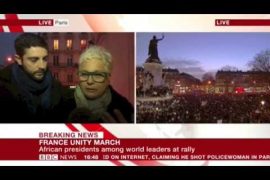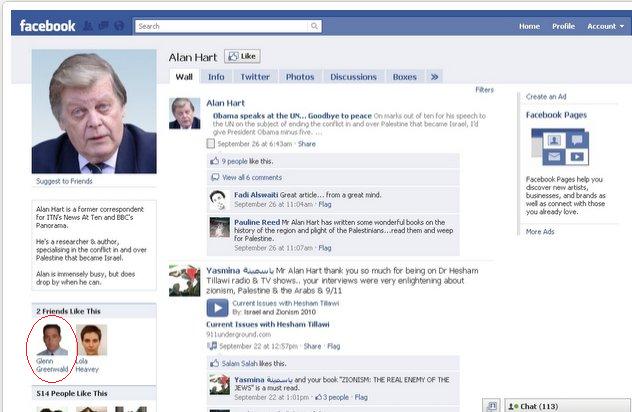On January 15th the BBC News website’s Middle East page ran an article headlined “Israel’s Netanyahu: Swedish FM’s remarks ‘outrageous’“. Readers are told that: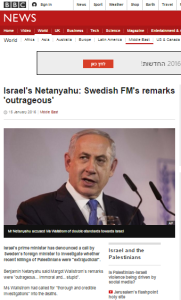
“Israel’s prime minister has denounced a call by Sweden’s foreign minister to investigate whether recent killings of Palestinians were “extrajudicial”.
Benjamin Netanyahu said Margot Wallstrom’s remarks were “outrageous… immoral and… stupid”.
Ms Wallstrom had called for “thorough and credible investigations” into the deaths.
Some 155 Palestinians – mostly attackers, Israel says – have been killed in unrest since October. […]
On Tuesday, Ms Wallstrom said it was “vital that there is a thorough, credible investigation into these deaths in order to clarify and bring about possible accountability”, according to Swedish media reports.” [emphasis added]
Leaving aside the embarrassingly uninformed nature of Margot Wallström’s latest insinuations about Israel, the remarkable thing about this BBC report is that those reading it have no way of knowing which of the two people quoted – Netanyahu or Wallström – is talking facts.
The reason for that is because – as has been noted here previously on numerous occasions – for more than three months the BBC has consistently avoided telling its audiences in its own words that the vast majority of Palestinian casualties during that time were killed whilst carrying out terror attacks or engaged in violent rioting. Instead, BBC reports have invariably used qualifying terms such as “Israel says” or “were said by Israel to be attackers”.
The question that therefore arises is does the BBC employ similar qualifying language when covering the shooting of attackers in other countries or is that editorial policy reserved for use when reporting about Israel?
In October of 2015 the BBC reported a story from Margot Wallström’s native Sweden.
“A masked man armed with a sword has killed a pupil and a teacher at a school in Sweden.
The suspect, clad in black, apparently posed for photos with students ahead of the attack, in the western town of Trollhattan.
Two further victims, a pupil and a teacher, are seriously injured. The attacker was shot by police and has died of his injuries. He was 21 and resident in Trollhattan, police said.”
No qualifying “Sweden says” there.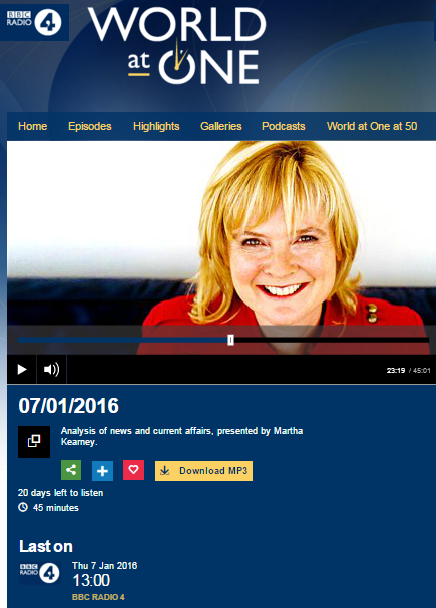
On January 7th the BBC covered an attack on a police station in Paris. BBC Radio 4’s ‘The World at One’ carried a report by Hugh Schofield (from 21:53 here, h/t HG) which includes the following statements: [emphasis added]
“He ran at the police station shouting Allahu Akbar and was not surprisingly stopped in his tracks by the guards – who now have semi-automatic weapons. They shot him and he fell and died subsequently. […]
There was this report that he was carrying some kind of suicide belt or something that looked like a suicide belt. […] I think it’ll be interesting to see whether there was a deliberate attempt to make it look as if he had one or not. It doesn’t really alter the essence of the affair which is that a man with a meat cleaver attacked a police station and was – not surprisingly, given these times – shot dead.”
No qualifying “said by France to be an attacker” there – and in the BBC’s written report on the incident, Schofield clearly signposted the attack for BBC audiences.
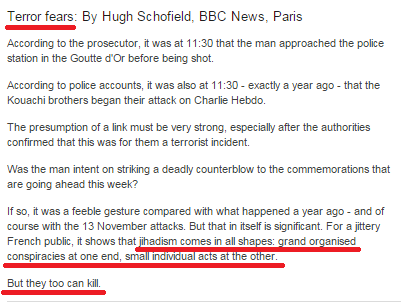
So apparently – in contrast to Israel, where the BBC selectively avoids the use of the word ‘terror’, there are no issues surrounding the use of the word when reporting from France. Apparently too, the BBC does not feel the need to portray information supplied by the Swedish and French authorities in qualifying terms which signal to audiences that there is room for doubt as to whether the person shot was actually carrying out an attack.
And whilst the BBC obviously finds it appropriate to amplify Margot Wallström’s insinuation that the shooting of terrorists in the act in Israel might be considered “extrajudicial”, in Paris terrorists are “not surprisingly” shot whilst carrying out attacks.
Related Articles:
Are BBC News reports on Palestinian deaths accurate and impartial?

